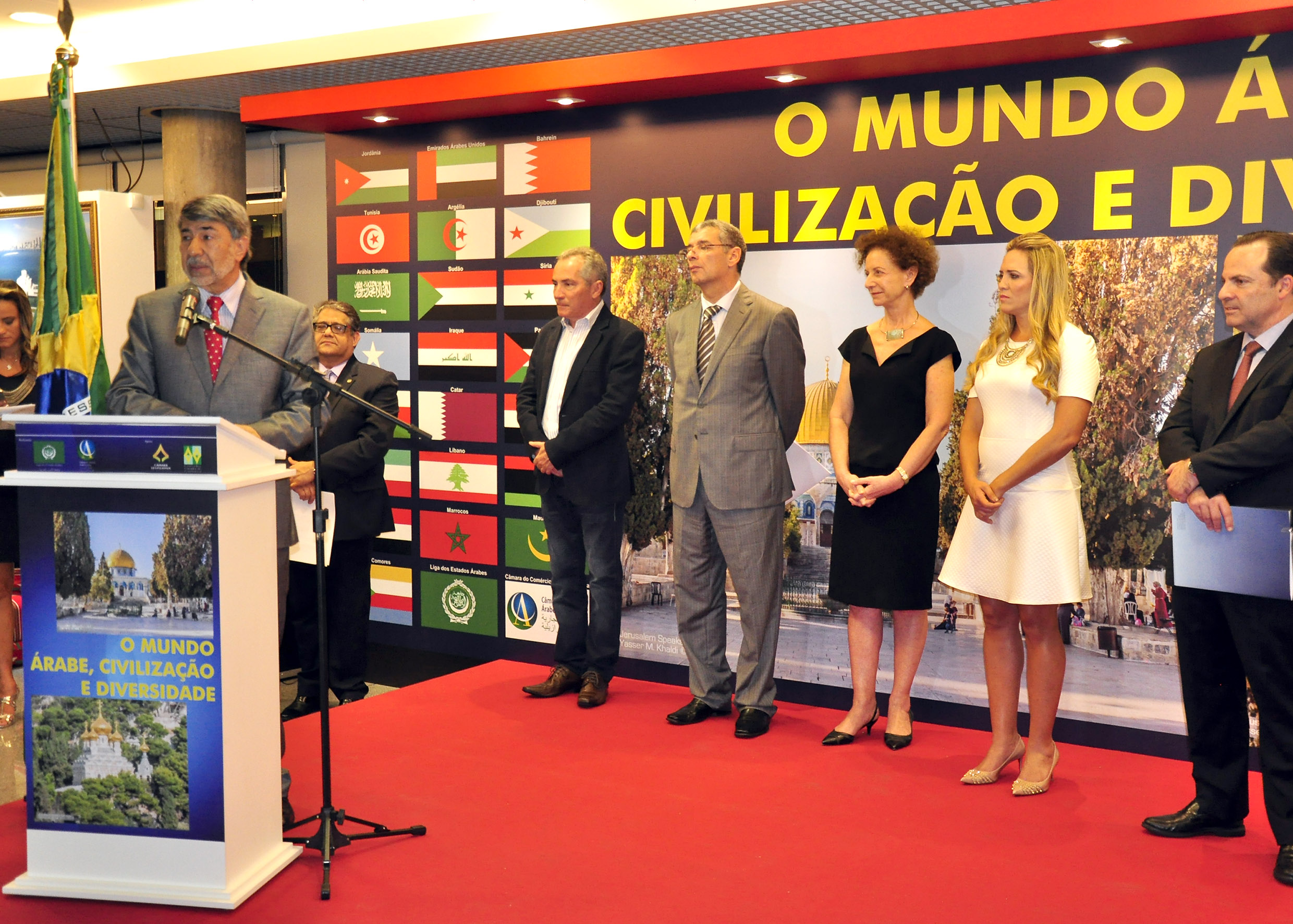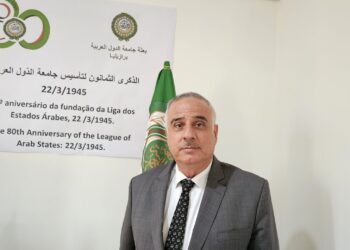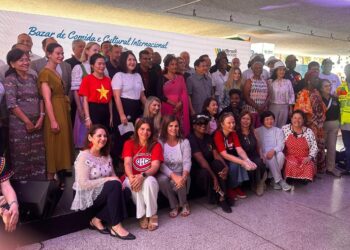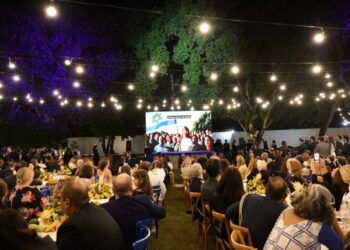[:pb]
16 countries of the Arab League particiapate of the exhibition of Arab photographs, clothing and craftwork
Oda Paula Fernandes
Representatives of the Council of Arab Ambassadors, of the Arab Brazilian Chamber of Commerce, and the president of the Legislative Chamber, the congresswoman Celina Leão, opens on June 8 the exhibition “The Arab World: Civilization and Diversity”. Paintings, art objects, clothing and other items of 16 countries of the Middle East and North Africa will give a sense of the culture and the traditions of that nations. The exhibition is part of the celebrations of the Day of the Arab Community in Brazil, which was on March 25. The exhibition will open at 6 pm, in the plenary hall and can be visited until May 6. Entry is free.
 The ceremony counted with the presence of the Dean of the Arab Ambassadors Ibrahim Alzeben, the president of the Chamber of the Arab Brazilian Commerce Marcelo Nahib Sallum, the Director of the Middle East department Lúcia Maria Scherer, the ambassador of the Arab League in Brazil Nascer Além, the Curator of Culture of the Legislative Chamber, Theófilo Silva and the president of the Legislative Chamber Celina Leão.
The ceremony counted with the presence of the Dean of the Arab Ambassadors Ibrahim Alzeben, the president of the Chamber of the Arab Brazilian Commerce Marcelo Nahib Sallum, the Director of the Middle East department Lúcia Maria Scherer, the ambassador of the Arab League in Brazil Nascer Além, the Curator of Culture of the Legislative Chamber, Theófilo Silva and the president of the Legislative Chamber Celina Leão.
Exhibition of culture and diversity – One of the main attractions of the exhibition is the collection of the prizewinner Algerian photographer Sofiane Bakouri, that registers the beauties of Algeria with emotion and spontaneity. Besides that there are photos, banners, art objects, clothing, carpets, videos, party dresses, jewelery, pictures, painting, mosaics, vases and porcelain objects. The pieces are from 16 Arab countries: Kuwait, Algeria, Egypt, Palestine, Sudan, Morocco, Mauritania, Oman, Saudi Arabia, Qatar, Lebanon, Tunisia, Jordan, Libya and the United Arab Emirates.
For the Dean of the Arab Embassies, Ibrahim Alzeben, this initiative can straighten the ties between Brazil and the Arab countries. “Our goal is to promote the Arab culture, a millenarian cultural diversity. It is important to self recognize ourselves mutually in order to know what is our contribution for the World Heritage in the past, in the present and in the future. If an Arab country was once important, Brazil is important at the present and it will be in the future”, emphasizes Alzeben.
According to the dean, around 13 million Arab and descendants live currently in Brazil. “For Arabs, Brazil was the country of the future, many came to live and work here since the late 17th century looking for a better life. Most of them came in the 19th century, as the Lebanese, the Syrian, the Palestinian, Moroccans and Iraqis”, affirmed the ambassador Ibrahim Alzeben.
The Brazilian ambassadress and director of the Middle East Department of Itamaraty Lúcia Maria Scherer spoke about the progress in the relations between Brazil and the Arab countries, specially in commerce, that doubled in ten years. “This approximation brought great benefit for all involved, that also went through a financially hard period as well as Brazil. The expectation is that we will all overcome these difficulties”, reveals Scherer.
Still according to the ambassadress Scherer, Brazil has deals in progress with the Arab countries in various fields – politics, economy, culture, cooperation, defense and memos in the specific fields like health, education, justice, sports, taxes and flight – which already yields good results. “This continuous approximation is important. Brazil is well cherished. We have a tradition on friendship, transparency and giving examples in the area of cooperation, which means treating us as equals. We operate with an open and sincere position”, says the ambassadress.
For the president of the Chamber of Arab Brazilian Commerce Marcelo Nabih Sallum, commerce has the distance as a challenge. However the volume generates the viability of the logistics of these commercial products. “We need to identify the opportunities of bringing products of the Arab world to Brazil. Promoting the twenty two countries in Brazil and promoting Brazil at these countries where it already is a great consumer, specially of hydrocarbon, oil, phosphate, fertilizer and other products”, affirms Sallum.
The Council of Ambassadors intends to mount the exhibition in the cities it will visit during the diplomatic travelings of its members. “We want to show this exhibition first to the public of Brasília and then to the Brazilian public in general, because we want to take it to the other capitals and cities of Brazil”, said the Palestinian diplomat.
A diversidade do mundo árabe na Câmara Legislativa
Exposição de fotos, vestimentas e artesanato tem a participação de 16 países da Liga Árabe
Oda Paula Fernandes
Representantes do Conselho de Embaixadores Árabes, da Câmara de Comércio Árabe Brasileira em parceria com a Câmara Legislativa do Distrito Federal (CLDF) realizam a mostra ‘O mundo árabe: civilização e diversidade’. A exposição, aberta nesta sexta-feira (8), faz parte das comemorações do Dia da Comunidade Árabe no Brasil, ocorrida em 25 de março passado, e poderá ser visitada até o dia 6 de maio. A entrada é gratuita.
 A cerimônia contou com a presença do Decano dos Embaixadores Árabes, Ibrahim Alzeben, do presidente da Câmara do Comércio Árabe Brasileira Marcelo Nabih Sallum, da diretora do Departamento do Oriente Médio Lúcia Maria Scherer, do embaixador da Liga Árabe no Brasil Nascer Além, do curador de Cultura da Câmara Legislativa Theófilo Silva e da presidente da CLDF Celina Leão.
A cerimônia contou com a presença do Decano dos Embaixadores Árabes, Ibrahim Alzeben, do presidente da Câmara do Comércio Árabe Brasileira Marcelo Nabih Sallum, da diretora do Departamento do Oriente Médio Lúcia Maria Scherer, do embaixador da Liga Árabe no Brasil Nascer Além, do curador de Cultura da Câmara Legislativa Theófilo Silva e da presidente da CLDF Celina Leão.
Mostra de cultura e diversidade – Uma das principais atrações é a coletânea do premiado fotógrafo Argeliano Sofiane Bakouri, que registra as belezas da Argélia com emoção e espontaneidade. Além disso, há fotos, banners, objetos de arte, trajes típicos, tapetes, vídeos, vestidos de festa, joias, gravuras, pinturas, mosaicos, vasos e objetos de porcelana. As peças vêm de 16 países árabes: Kuwait, Argélia, Egito, Palestina, Iraque, Sudão, Marrocos, Mauritânia, Omã, Arábia Saudita, Catar, Líbano, Tunísia, Jordânia, Líbia e Emirados Árabes Unidos.
Para o Decano das embaixadas árabes, Ibrahim Alzeben, essa iniciativa serve para estreitar os laços entre o Brasil e os países Árabes. “Nosso objetivo é promover a cultura árabe, a diversidade cultural milenar. É autorreconhecermos mutuamente para saber qual a nossa contribuição para o Patrimônio Mundial da Humanidade no passado, no presente e para o futuro. Se algum país árabe foi importante no passado, o Brasil é importante no presente e será no futuro”, enfatiza Alzeben.
De acordo com o decano, cerca de 13 milhões de árabes e descendentes vivem no Brasil. “Para os árabes o Brasil era o país do futuro, e muitos vieram morar e trabalhar no aqui desde o final do século 17, em busca de uma vida melhor. Mas a maior parte veio no século 19, como os libaneses, os sírios, os palestinos, os marroquinos e iraquianos”, afirmou o embaixador Ibrahim Alzeben.
A embaixadora brasileira e diretora do Departamento do Oriente Médio no Itamaraty Lúcia Maria Scherer, falou sobre os avanços nas relações entre o Brasil e os países árabes, em especial no comércio, que duplicou em pouco mais de uma década. “Essa aproximação trouxe grande benefício para todos os envolvidos, que também passam por um momento financeiramente difícil, assim como o Brasil. Mas a expectativa é que todos vão superar essas dificuldades”, revela a Scherer.
Ainda segundo a embaixadora Scherer, o Brasil tem em andamento acordos com os países árabes em diversas áreas – política, econômica, no âmbito da cultura, de cooperação, de defesa; também memorandos em áreas mais específicas como saúde, educação, justiça, esporte, tributária e aéreas – que já rendem bons resultados. “Esse contínuo da aproximação é importante. O Brasil é muito bem quisto. Nós temos uma tradição de amizade, de transparência e de dar exemplos na área de cooperação, que é tratar de igual para igual. Atuamos com uma postura aberta e franca”, revela a embaixadora.
Para o presidente da Câmara de Comércio Árabe Brasileira, Marcelo Nabih Sallum, o comércio tem como desafio a distância. Porém o volume gera a viabilidade da logística desses produtos comercializados. “Precisamos identificar oportunidades de trazer produtos do mundo árabe para o Brasil. Promover os vinte dois países no Brasil e promover o Brasil nesses países onde ele já é um grande consumidor, principalmente de hidrocarboneto, petróleo, fosfato, fertilizante entre outros produtos”, afirma Sallum.
O Conselho de Embaixadores pretende montar a exposição nas cidades que forem visitar durante as viagens diplomáticas de seus membros.“Queremos mostrar essa exposição ao público brasiliense primeiro e, depois, ao público brasileiro em geral, pois queremos levá-la para outras capitais e cidades do Brasil”, contou o diplomata palestino.


















